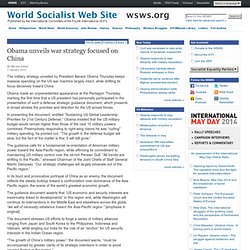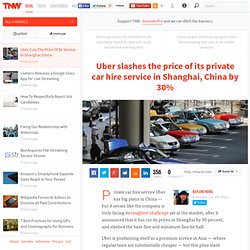

Obama unveils war strategy focused on China - World Socialist Web Site. By Bill Van Auken 7 January 2012 The military strategy unveiled by President Barack Obama Thursday keeps massive spending on the US war machine largely intact, while shifting its focus decisively toward China.

Obama made an unprecedented appearance at the Pentagon Thursday, marking the first time that a US president has personally participated in the presentation of such a defense strategic guidance document, which presents in broad strokes the priorities and direction for the US armed forces. In presenting the document, entitled “Sustaining US Global Leadership: Priorities for 21st Century Defense,” Obama insisted that the US military budget would remain higher than those of the next 10 military powers combined. Preemptively responding to right-wing claims he was “cutting” military spending, he pointed out, “The growth in the defense budget will slow, but the fact of the matter is this: It will still grow.” The strategic guidance represents nothing of the sort. China's Tencent Inks Logistics Deal. Chinese Internet giant Tencent is making a firm commitment to e-commerce today, with its announcement of a HK$1.5 billion ($195 million) investment in China South City today, a logistics and trade center operator.
This hints that Tencent-owned WeChat, a wildly popular messaging service in the country, could see e-commerce becoming a larger part of its future — given that it has already taken a huge step forward in this aspect. Tencent president Martin Lau says that as Chinese firms seek to expand their businesses online, teaming up with China South City allows the company to “jointly facilitate such enterprises migrating online, utilizing China South City’s physical locations and logistics capabilities, together with Tencent’s Internet user platforms and technology capabilities.”
Tencent’s move comes as its rival, Chinese e-commerce giant Alibaba, recently invested $364 million into electronics manufacturer Haier Group, seeking to extend its logistics and delivery capacity. Uber Cuts The Price Of Its Service In Shanghai, China. Private car hire service Uber has big plans in China — but it seems like the company is truly facing its toughest challenge yet in the market, after it announced that it has cut its prices in Shanghai by 30 percent, and slashed the base fare and minimum fare by half.

Uber is positioning itself as a premium service in Asia — where regular taxis are substantially cheaper — but this price slash could narrow the gap, as an email to its Shanghai users explains: Uber is about being everyone’s private driver, and that’s what this is about. For less than the price of a latte, you can now have an Audi A6 waiting for you when you get outside to take you to work. For example, a one-way trip to Shanghai Pudong International Airport will now cost CNY350 ($58), as opposed to CNY600 ($99) under the previous pricing system. Comparatively, a taxi costs approximately CNY150 ($25) from Pudong International Airport to People’s Square, the center of the city, according to a China travel guide site. BTC China Accepting Renminbi Again. BTC China, until recently the world’s largest Bitcoin exchange, has begun allowing users in China to make deposits in their local currency (Renminbi), ending a six-week block that affected domestic users and sent the price of the virtual currency tumbling.
The site stopped accepting deposits in Renminbi on December 18 following a memo issued by the Bank of China (BoC) that warned of the risks surrounding Bitcoin, although users could use US dollars and other international currencies. That action is thought to have been the spark that sent the valuation of Bitcoin crashing from $880 to $435 in under a day. BTC China CEO Bobby Lee tells Coinbase that the company has reassessed the implications of that note, and decided that it wasn’t aimed at Bitcoin businesses. You’ll note this is Lee’s assumption, since it appears he hasn’t had direct contact with the government or BoC: Previously, we judged doing this as not being viable, however, we have since changed our stance. Here Come…China’s Drones. China’s Abandoned Wonderland Posted by Morrison Conway on April 24, 2012 · 3 Comments About 20 miles northwest of central Beijing lies Chenzhuang Village, now a decrepit ruinous amusement park called Wonderland that lay near a highway, surrounded by fields of corn.

In its infancy, Wonderland was promised by local government officials to be “the largest amusement park in Asia” but construction stopped in 1998 after disagreements between farmers and local government over property prices. Reconstruction began again in 2008 but it was to no avail. Here are photographs by Reuters photographer David Gray who visited the site last December and brought home these images of a failed and now haunting vision of Wonderland.
(via The Atlantic) Like this: Like Loading...